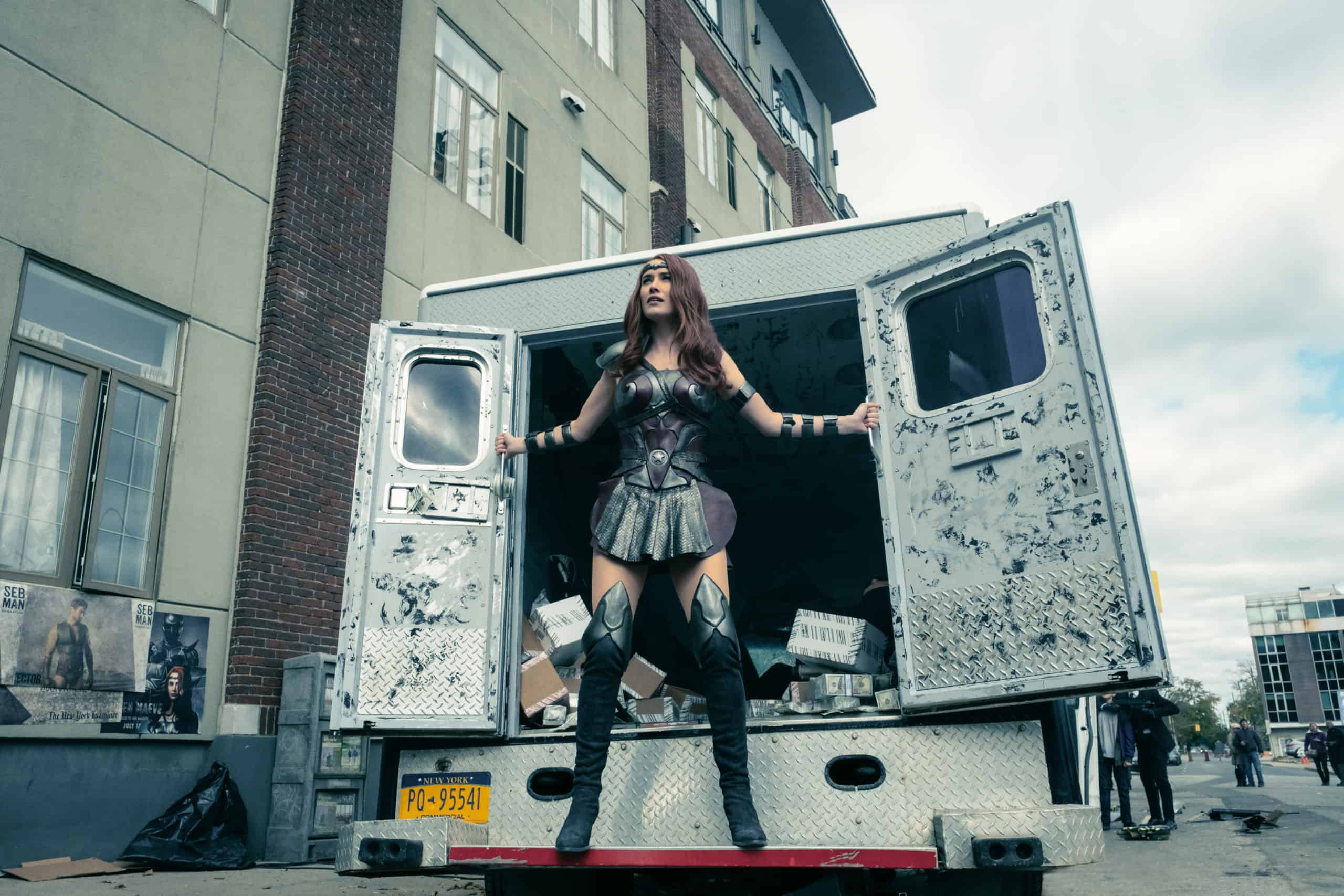This article contains minor spoilers for the TV series, The Boys.
What do you get when you add superheroes to American life as we know it today? Creator and show-runner of The Boys, Eric Kripke, answers with a mixture of the charisma of movie stars, the lethality of military-grade weapons, and the soullessness of a multibillion-dollar corporation. Superheroes (or ‘Supes’) are brands, often more concerned with their public image (and making money from endorsements) than actually saving lives. The Seven, the premier supes of the U.S., are pitted against the Boys, four men (and later, one woman) who are committed to taking them down.
But where The Boys could’ve stayed with the superficial explosions and gunfights, it keeps returning to the broken humanity of all the people involved. Queen Maeve (Dominique McElligott), one of the Seven, puts it succinctly: “Everyone always asks, what’s our special weakness? … Our weakness is the same as anyone’s. It’s people. The people we care about.”
The supes, most of whom are physically impervious, live their lives without too much concern for the people around them (though plenty are scared of more-powerful supes). They are almost all managed by Vought International, the Disney-esque company that controls the branding, marketing, and cover-ups. When timid Hughie (Jack Quaid) sees his girlfriend killed in a horrific accident caused by a supe, a Vought lawyer shows up trying to pay him off to sign a non-disclosure agreement. Hughie refuses, and is approached by Billy Butcher (the effortlessly charismatic Karl Urban) who wants Hughie’s help to expose Vought’s corruption. And over the rest of the season as we are introduced to the two sides, the Supes and the Boys, we find that every person carries wounds, every person is somehow broken, and every person hurts those around them.
Hughie, the point-of-view character whom we follow into this world of glamor and gore, meets and falls for the newest member of the Seven, Starlight (Erin Moriarty). And as she falls for him as well, they begin their secret romance. Both of them feel like they have to ‘put on a face’ to the rest of the world, and only feel comfortable dropping the masks around each other. But shared secrets are not true intimacy, and they both avoid working on a deeper relationship. Hughie lies to Starlight again and again as he tries to infiltrate Vought, even as his feelings for her deepen. Starlight, disillusioned by the insincerity of both Hughie and her own mother, pushes away her weaknesses – the people she cares about.
Hughie’s and Starlight’s flights from love are foreshadowed in the leaders of the Boys and the Supes, Billy Butcher and Homelander (Antony Starr). The two men close themselves off from love. They both carry deep wounds , and neither really knows how to heal. So they lash out. They murder those who go against them. They refuse to find love in new places. As Maeve said, they consider people to be weaknesses, and try to remove every potential weakness in their lives. They use the people who trust them, exploiting that trust to further their agendas. Further, Butcher and Homelander try to make Hughie and Starlight in their own image: powerful, bitter and vengeful.
Despite these lessons against vulnerability, two side characters insist on the need for love. Frenchie (Tomer Capon) and Maeve both fight for love, even as they are hurt by that fight. Frenchie tries to befriend the scared and abused ‘Female’ (Karen Fukuhara). Frenchie is by no means a gentle soul (we are introduced to him as the gun-brandishing superhero-killer), but recognizes his own past in the Female. Even though she continues to run, endangering Frenchie and the other Boys, he refuses to use violence against her. Butcher tries to assert his image of invulnerability upon Frenchie, but the latter seems to understand something deeper about how relationships grow. He is no starry-eyed Hughie; his love is tempered by the pain of the world. Where Hughie is often overwhelmed by his fear and Butcher is driven by ruthless vengeance, Frenchie commits himself to follow a vulnerable love.
Whereas Frenchie fights for a new love in his life, Maeve tries to rebuild a past love. One of the oldest of the Seven, she seems burnt out from dealing with Homelander’s hate. In the above quote, when she tells Starlight about how people we care about are our weakness, she ends the scene with, “So I say, cut ‘em loose.” But despite this rhetoric, she keeps trying to rekindle her relationship with an old lover (Nicola Correia-Damude). What is most striking about Maeve is that she isn’t some paragon. Even though not as morally bankrupt as Homelander, she falls in line behind him rather than risk his anger. She rebuffs Starlight’s attempts to try to fight for justice. She isn’t perfect. But how many of us are?
In a show filled with almost gleeful amounts of gore, Maeve is one of the few people who is genuinely disgusted by her own complicitness. Maeve, like all of us, desperately wants to be vulnerable in a world that prizes her imperviousness. She tries to do the ‘right thing,’ even though she doesn’t really know what the right thing is anymore. She seeks forgiveness, even as she doesn’t know how to ask for it. She fights for love, even though she doesn’t really know if that love is worth the pain it would bring. Because Maeve realizes that fighting for love isn’t about just making yourself happy; the fight itself makes the world a little bit better.
The Boys is available for streaming on Amazon Prime. Season 2 is currently airing on Fridays.


